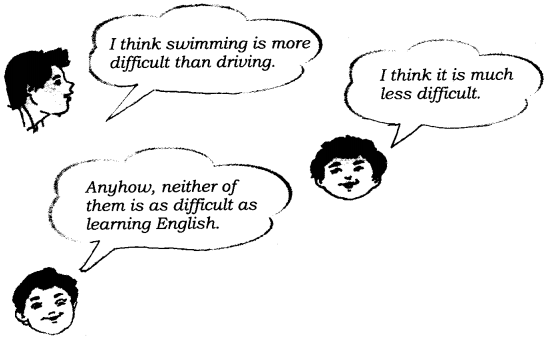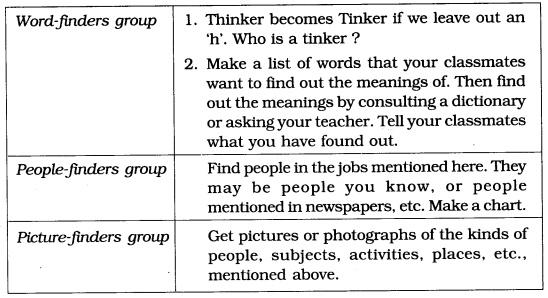NCERT Solutions for Class 6 English Honeysuckle Chapter 3 Taro’s Reward are part of NCERT Solutions for Class 6 English. Here we have given NCERT Solutions for Class 6 English Honeysuckle Chapter 3 Taro’s Reward.
| Board | CBSE |
| Textbook | NCERT |
| Class | Class 6 |
| Subject | English |
| Chapter | Chapter 3 |
| Chapter Name | Taro’s Reward |
| Number of Questions Solved | 20 |
| Category | NCERT Solutions |
NCERT Solutions for Class 6 English Honeysuckle Chapter 3 Taro’s Reward
TEXTUAL QUESTIONS
(Page 34)
Working with the Text
A. Answer the following questions.
Question 1.
Why did Taro run in the direction of the stream ? (5)
Solution:
Taro ran in the direction of the stream because he had heard the sound of falling water. Earlier, he had neither heard nor seen any stream nearby ; so he ran to see what it was.
Question 2.
How did Taro’s father show his happiness after drinking sake ? (7)
Solution:
Taro’s father stopped shivering and did a little dance in the middle of the floor. Thus he showed his happiness.
Question 3.
Why did the waterfall give Taro sake and others water ? (12)
Solution:
The waterfall gave sake to Taro because he was a thoughtful son. It was his reward for his care of his old parents. Since no one else had that quality, they got only cold water.
Question 4.
Why did the villagers want to drown Taro ? (10, 11)
Solution:
The villagers wanted to drown ‘Taro because they thought that they had been tricked by him. Taro had told them that the waterfall gave sake. They were getting cold water.
Question 5.
Why did the Emperor reward Taro ? (13)
Solution:
The emperor rewarded Taro for being very good and kind towards his parents. This was the emperor’s way to encourage all children to honour and obey their parents.
B. Mark the right item.
Question 1.
Taro earned very little money because
- he didn’t work hard enough.
- the villagers didn’t need wood.
- the price of wood was very low.
Solution:
3. the price of wood was very low. ✓
Question 2.
Taro decided to earn extra money
- to live a more comfortable life.
- to buy his old father some sake.
- to repair the cracks in the hut.
Solution:
2. to buy his old father some sake. ✓
Question 3.
The neighbour left Taro’s hut in a hurry because
- she was delighted with the drink.
- she was astonished to hear Taro’s story.
- she wanted to tell the whole village about the waterfall.
Solution:
3. she wanted to tell the whole village about the waterfall. ✓
Working with Language
Question A.
Strike off the words in the box below that are not suitable. Taro wanted to give his old parents everything they needed. This shows that he was………..

Solution:

B.
Question 1.
“This made Taro sadder than ever.” This’ refers to
- a strong wind that began to blow.
- Taro’s father’s old age.
- Taro’s inability to buy expensive sake for his father. (Mark the right item.)
Solution:
3. Taro’s inability to buy expensive sake for his father. ✓
Question 2.
“This, said the emperor, was to encourage all children to honour and obey their parents.” “This’ refers to
- the most beautiful fountain in the city.
- rewarding Taro with gold and giving the fountain his name.
- sending for Taro to hear his story. (Mark the right item.)
Solution:
2. rewarding Taro with gold and giving the fountain his name.”
C. Arrange the words below in pairs that rhyme.
Example :
young – lung
money – sunny

Solution:

D.
Question 1.
Fill in the blanks with words from the box.

A ___________ (i) ___________ woodcutter lived on a ___________ (ii) ___________ hillside. He was a ___________ (iii) ___________ son who worked ___________ (iv) ___________ but earned ___________ (v) ___________ money. One day he saw a ___________ (vi) ___________ waterfall hidden behind a rock. He tasted the water and found it ___________ (vii) ___________ .
Solution:
(i) young
(ii) lonely
(iii) thoughtful
(iv) very hard
(v) little
(vi) beautiful
(vii) sake.
Question 2.
Find these sentences in the story and fill in the blanks.
1. This made Taro (i) ___________ than ever. (3)
2. He decided to work (ii) ___________ than before. (3)
3. Next morning. Taro jumped out of bed (iii) ___________ than usual. (4)
4. He began to chop even (iv) ___________ . (4)
5. Next morning, Taro started for work even (v) ___________ than the morning before. (10)
Solution:
(i) sadder
(ii) harder
(iii) earlier
(iv) faster
(v) earlier
Speaking and Writing
Question A.
Speak the following sentences clearly but as quickly as you can. Learn them by heart.
- How much wood would a woodchuck chuck if a woodchuck would chuck wood.
- Betty bought a bit of butter, but the bit of butter was a little bitter so she bought some better butter to make the bitter butter better.
Solution:
No answer required.
B.
Question 1.
The story Taro’s Reward’ shows that Taro is thoughtful, hardworking and also wise. Read aloud the parts of story that show these qualities in Taro.
Solution:
No answer required. Please try yourself.
Question 2.
- Like Patrick in the story ‘Who Did Patrick’s Homework’, Taro is helped by magic. Do you believe in magic. What are the magical things that happen in these stories ?
- Which story do you like better, and why ? Do you know such stories in other languages ? Discuss these questions in class.
Solution:
- I do not believe in magic. In the first story, it is an elf who helps Patrick do his homework. In the second story, it is the magic waterfall that helps Taro satisfy his father’s wish.
- I like Taro’s story better because it teaches us to help our parents. There are such stories in every language. For example, in Sanskrit, there are Ramayana and Mahabharata which are full of such stories. In Ramayana Lord Hanuman not only crosses the ocean but enters Lanka in the shape of a mosquito.
Question 3.
Now write a paragraph or two about these two stories, comparing them.
Solution:
Both the stories have an element of magic. In the first story the elf does Patrick’s homework. In the second story the magic waterfall gives Taro sake. The first story is, however, more convincing because there, the elf is only a symbol. It helps Patrick do his homework. In fact it is Patrick’s hard work which makes him a model kid. In the second story the element of magic is more obvious. The waterfall gives everyone water and to Taro sake.
C.
Question 1.
Listen to these children. What are they talking about ?

Solution:
The children are talking about their difficulties.
Question 2.
Work in groups. Come to some agreement on each of the activities given below. Decide which is the most interesting, dullest, most dangerous, safest, most rewarding, most exciting.

Solution:
Most interesting : reading, watching TV, stamp collecting, listening to music, dance
Dullest : knitting, cooking, learning languages
Most dangerous : swimming, mountain climbing
Safest : walking
Most rewarding : fishing, sewing, painting
Most exciting : playing football
(Various answers are possible for this question depending on individual taste.)
Dictation
Question 1.
Your teacher will speak the words given below. Write against each two new words that rhyme with it.
- bed ___________ ___________
- wax ___________ ___________
- fast ___________ ___________
- chop ___________ ___________
- young ___________ ___________
Solution:
- bed red wed
- wax axe fax
- fast last caste
- chop drop shop
- young tongue rung
We hope the NCERT Solutions for Class 6 English Honeysuckle Chapter 3 Taro’s Reward help you. If you have any query regarding NCERT Solutions for Class 6 English Honeysuckle Chapter 3 Taro’s Reward, drop a comment below and we will get back to you at the earliest.
